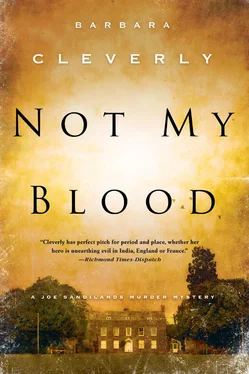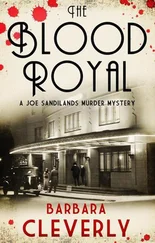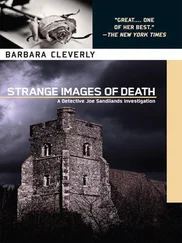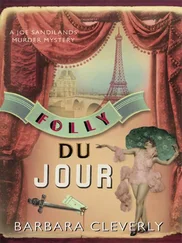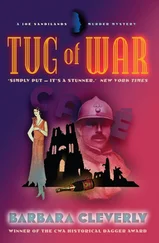Barbara Cleverly - Not My Blood
Здесь есть возможность читать онлайн «Barbara Cleverly - Not My Blood» весь текст электронной книги совершенно бесплатно (целиком полную версию без сокращений). В некоторых случаях можно слушать аудио, скачать через торрент в формате fb2 и присутствует краткое содержание. Год выпуска: 2012, ISBN: 2012, Издательство: Soho Press, Жанр: Исторический детектив, на английском языке. Описание произведения, (предисловие) а так же отзывы посетителей доступны на портале библиотеки ЛибКат.
- Название:Not My Blood
- Автор:
- Издательство:Soho Press
- Жанр:
- Год:2012
- ISBN:978-1-61695-155-9
- Рейтинг книги:3 / 5. Голосов: 1
-
Избранное:Добавить в избранное
- Отзывы:
-
Ваша оценка:
- 60
- 1
- 2
- 3
- 4
- 5
Not My Blood: краткое содержание, описание и аннотация
Предлагаем к чтению аннотацию, описание, краткое содержание или предисловие (зависит от того, что написал сам автор книги «Not My Blood»). Если вы не нашли необходимую информацию о книге — напишите в комментариях, мы постараемся отыскать её.
Not My Blood — читать онлайн бесплатно полную книгу (весь текст) целиком
Ниже представлен текст книги, разбитый по страницам. Система сохранения места последней прочитанной страницы, позволяет с удобством читать онлайн бесплатно книгу «Not My Blood», без необходимости каждый раз заново искать на чём Вы остановились. Поставьте закладку, и сможете в любой момент перейти на страницу, на которой закончили чтение.
Интервал:
Закладка:
“A courtesy call, professor,” said Joe amiably. “You will have observed no squad cars, no secretary.… I don’t even bring a notebook. I feel I ought to apologise for our lack of political clout or motivation. I’ll come straight to our problem. A child went missing in the wilds of Sussex yesterday morning. A sick child. An epileptic child. In transit from his school on the south coast to his home in London, he was conveyed to a hospital whose identity we do not know, and he’s not been seen since. Much turbulence and anxiety at both the school and the family home. Inevitably, ‘Who do we know at the Yard?’ is the question on everyone’s lips. And the answer, predictably: Commissioner Trenchard. My boss asked me to investigate.”
“Ah. And sleuth that you are, you pounce on the word ‘epilepsy’ and pop round to see me?”
“In a nutshell, sir.”
“True, the condition was, at one time, a special study of mine, though I am involved with larger subjects these days. His name?… Spielman? No. I’m almost certain-not on our books. But wait.”
He opened the door to an adjoining room and called into it: “Miss Stevens! Check a patient name for me, will you? Spielman.” He spelled it out with an eye on Joe, who nodded confirmation.
A moment later his secretary appeared in the doorway holding a file. “Sorry, sir, no one of that name. This is the nearest I could get.”
She held out a file discreetly, the name hidden from view. Bentink, with a gesture that said he had nothing to hide, took it and read out loud: “Speerman. Ah. A miss is as good as a mile. Sorry, gentlemen.”
The secretary reclaimed the file and withdrew.
“I have a photograph,” Joe said. He reached into his breast pocket and took out the ten cut-outs, selecting the picture of Spielman.
Bentink took it from him and looked at it without much interest. “No. I have never encountered this child.” He looked with slightly more curiosity at the remaining photographs in Joe’s hand.
Joe began to lay them out in front of Bentink. He was suddenly stricken with embarrassment to see the crudely cut shapes, which were beginning to curl up on themselves like brandy snaps sitting incongruously on the sleek ebony surface of the desk. An automatic gesture from Bentink revealed that he was having the same reaction-he put out a pad of three manicured fingers and flattened the one nearest to him. Joe flinched to see the small face obliterated.
Bentink caught Joe’s hesitation. “Odd things the Yard has in its pockets! What are you showing me? A new parlour game? Spot the Criminal of the Future? That’s easy! He is. Number six.”
Bentink poked a finger at one of the faces, pushing Pettigrew, the grocer’s son, out of line. “Hard to judge at this age, of course, before the features are sufficiently developed but-speaking purely as a participant in a parlour game-I’d keep an eye on this little thug, Sandilands! A client in the making, if ever I saw one.
“Number three-a tragedy-is a mongoloid type,” he rattled on, enjoying himself. “They don’t have much of a hold on life, you know. A goner by now? This snap wasn’t taken yesterday.
“Number five is ill. Possibly tubercular? I’d have him seen to.
“Number eight-troubled face. Haunted. He’s not seeing what we see. Has he-what’s your phrase? — got form, commissioner?”
“Arsonist,” Joe said, and the response seemed to please the professor.
“Quite a rogues’ gallery. Wouldn’t breed from any of ’em-apart from number seven, who looks perfectly normal.”
“Lucky you’re taking this as a game,” Joe said with asperity, “or I’d have to think that, in your eyes, the last-century views of Cesare Lambroso still held good. The bony forehead, the large jaw, the prominent eye ridges: sure signs of a born-in-the-bone criminality.” He allowed his gaze for the briefest moment to skate across Bentink’s uncompromising features.
The professor almost smiled. “I think Charles Goring refuted all that,” he replied easily. “But you would know more than I on that subject. Never forget, Sandilands, you and I both have this in common with Socrates: We’re neither of us oil paintings. Could both scare the horses if the light was right. But you, I’d judge, were at least born attractive. Fate clearly took a scalpel to those handsome features, but by then you’d learned that appearance is related to self-worth and behaviour. Handsome is as handsome does. I often note that.”
“In fairy tales, perhaps,” Joe mused. “Not necessarily in the street or the laboratory.”
“Certainly not in Parliament. And that’s a pity. We must be forwards-looking, Sandilands, if we’re to maintain our position in the world. To be the best, we must breed the best.”
He cut himself short, sat back, and fixed Joe with a suddenly weary look. He waved a hand over the photographs. “Interesting, but-in answer to your question-I haven’t bumped off any of these boys.”
“I don’t believe I asked that question.”
“Oh, come on! Met Officers don’t carry around photographs of boys who are alive and well and toasting crumpets for tea this Saturday afternoon. They’re missing, presumed dead, and you’re investigating. I’m sorry, but I can’t help you.”
He slid the pictures roughly into a pile like cards with Spielman on top. “This boy. The most recent? Epileptic? Sad. Had the child been brought to us here, we would have been able to treat him, I’m sure. But-‘lost,’ you say? An ‘unknown’ hospital? I find this difficult to understand. An odd set of circumstances, wouldn’t you say?”
“Yes, and imposed by the vagaries of the English weather. February. Telephone lines down, roads blocked. The boy’s family is about to return to Germany, and they’re finding their plans disrupted. Various people have involved themselves in lending a hand. You see before you a selection of those Good Samaritans.”
“A German family, you say … Spielman.…”
“Diplomatic service.”
“Not just any child, then. Embassy involved? Guaranteed to whip up a froth. I begin to see why they’ve got you chasing about the countryside, Sandilands. Our German cousins are exercising an ever stronger influence over our top brass. Hah! Gosling! I know you’re understaffed in the Cromwell Road, but you’re also blinkered. Focused on the Red Menace and the Green, Russia and Ireland. Have I at last got through to your superiors with the suggestion that they give more attention to the old enemy? Germany! I was over there last year with a delegation, on a professional visit. Cozying up, breathing admiration, swearing eternal friendship, meeting their top scientists. Not being classed as a top scientist myself, I was paired with a policeman. A certain Rudolph Diels. Heard of him? No? You’d better do some homework, then. Because you will hear of him. Impressive fellow! Young and vigorous, gallantly scarred face of a duellist, and head of the Prussian Political Police. We had a long conversation about the work he is commissioning from men like me-from my German confrères, that is.”
“Work for which the National Socialist government sees a need?” Joe asked.
“Ah, yes. All spies cozily together as we are, I suppose I may divulge these things. Just a few days into his new office-the thirtieth of January, wasn’t it, the election victory? Mere days! Chancellor Hitler is sweeping through government. Heads are rolling. Resignations being tendered, appointments being made. That’s probably what your Spielman is up to. Been recalled to do his patriotic duty at the side of his new master. And we see changes already in the university psychology departments. Jews-or those who merely have a Jewish wife-who have been at the forefront of research are packing up and coming to England or crossing the Atlantic. Before any lecture can begin in the universities-you’ll find this hard to believe-the academic giving it is now required, on pain of instant dismissal, to salute and say the words ‘Heil Hitler!’ ”
Читать дальшеИнтервал:
Закладка:
Похожие книги на «Not My Blood»
Представляем Вашему вниманию похожие книги на «Not My Blood» списком для выбора. Мы отобрали схожую по названию и смыслу литературу в надежде предоставить читателям больше вариантов отыскать новые, интересные, ещё непрочитанные произведения.
Обсуждение, отзывы о книге «Not My Blood» и просто собственные мнения читателей. Оставьте ваши комментарии, напишите, что Вы думаете о произведении, его смысле или главных героях. Укажите что конкретно понравилось, а что нет, и почему Вы так считаете.
